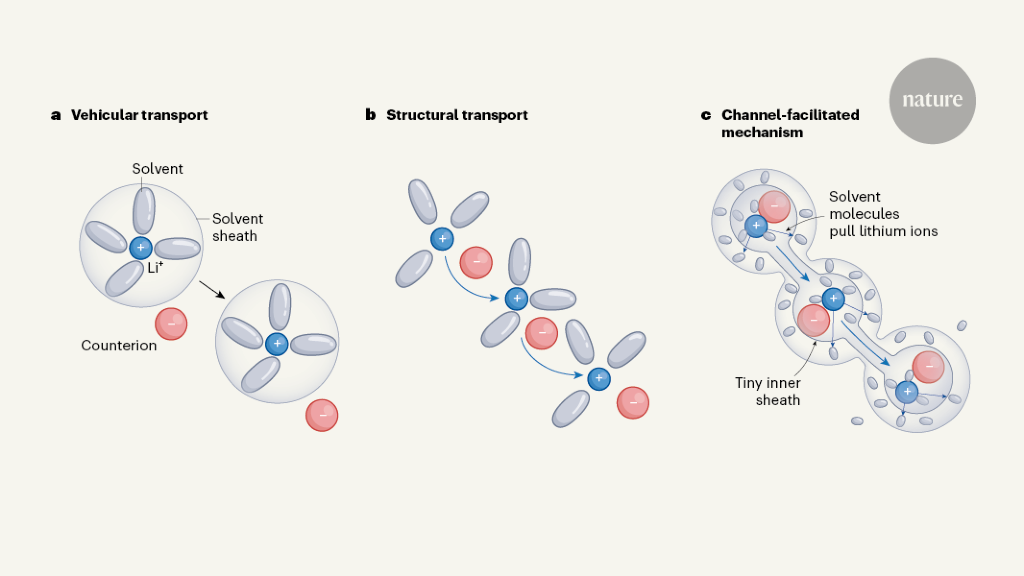Enhancing Lithium Battery Performance with Solvent Upgrades
Kernekoncepter
The author argues that upgrading the electrolyte of lithium batteries with organic solvents can significantly improve ion mobility, leading to faster charging and enhanced performance even at extremely low temperatures.
Resumé
Upgrading the electrolyte of lithium batteries is crucial to address issues like lengthy charging times and poor performance at low temperatures. According to Lu et al., organic solvents composed of small molecules have shown promising results in improving ion mobility within lithium-ion-battery electrolytes. This enhancement enables rapid charging and impressive battery performance, even in extreme cold conditions like -80 °C.
Tiny sheaths of solvent boost battery performance
Statistik
"organic solvents consisting of small molecules can greatly improve ion mobility in lithium-ion-battery electrolytes"
"fast charging and impressive battery performance at temperatures as low as −80 °C"
Citater
"upgrade the electrolyte of lithium batteries with organic solvents can significantly improve ion mobility"
"impressive battery performance at temperatures as low as −80 °C"
Vigtigste indsigter udtrukket fra
by Chong Yan kl. www.nature.com 02-28-2024
https://www.nature.com/articles/d41586-024-00378-0
Dybere Forespørgsler
How do other types of solvents compare to organic solvents in enhancing battery performance
Other types of solvents, such as inorganic solvents or polymer-based electrolytes, have been explored for enhancing battery performance. In comparison to organic solvents, these alternatives may offer different advantages and drawbacks. For instance, inorganic solvents can provide higher thermal stability but might suffer from lower ion conductivity compared to organic solvents. On the other hand, polymer-based electrolytes could offer improved safety due to their non-flammable nature but may exhibit lower lithium-ion transport properties than organic solvent-based systems. Therefore, while each type of solvent has its unique characteristics that can impact battery performance differently, organic solvents seem particularly promising based on recent research findings.
What are the potential drawbacks or risks associated with using these upgraded electrolytes in lithium batteries
Using upgraded electrolytes in lithium batteries does come with potential drawbacks and risks that need to be considered. One significant concern is the compatibility of these new materials with existing battery components like electrodes and separators. If there are any chemical interactions leading to degradation or instability within the battery system, it could reduce overall performance and lifespan. Additionally, the cost associated with implementing these advanced electrolytes on a large scale could be prohibitive initially until manufacturing processes are optimized for efficiency. Moreover, there might be environmental implications if certain components of the upgraded electrolytes prove challenging to recycle or dispose of sustainably.
How might advancements in battery technology impact renewable energy storage solutions
Advancements in battery technology have the potential to significantly impact renewable energy storage solutions by addressing key challenges currently faced in this field. Improved battery performance through innovations like enhanced ion mobility and fast charging capabilities can lead to more efficient energy storage systems for renewable sources such as solar and wind power. This increased efficiency enables better integration of renewables into existing grids by providing reliable backup power during periods of low generation or high demand. Furthermore, advancements in battery technology can contribute to reducing reliance on fossil fuels for electricity generation by enabling greater utilization of clean energy sources at all times.
0
